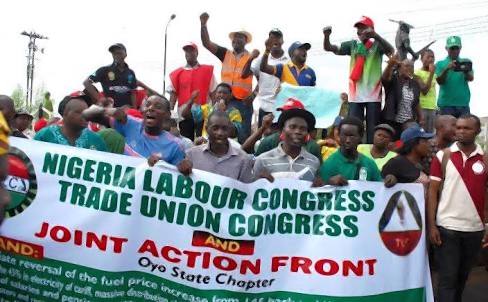Failure of the Federal Government and the Organised Labour to reach a truce may eventually result in the different labour unions in the country calling their members to embark on an indefinite nationwide strike said to begin from 12 a.m. on Tuesday, November 6.
Already, the Minimum Wage Committee is divided over N24,000 and N30,000 as both figures have been sent to President Muhammadu Buhari for consideration.
Consequently, talks between the government, organised labour and private sector were in the afternoon deadlocked on the minimum wage.
Another round of meeting resolve the impasse as a means of averting the impending strike is being held Monday from 10 a.m. in Abuja.
So far, oil workers, aviation staffers and members of Joint Health Workers Unions (JOHESU), among others have indicated their readiness to participate in the strike.
Reports from various parts of the country showed that many customers of commercial banks in the country engaged in panicky withdrawals of money using Automated Machine (ATM) to check lack of cash in event of the strike.
Nigerian governors met in Abuja, October 31 night and said they can only increase workers salary in their states from N18,000 to N22, 500 per month.
The resolve of the governors was contrary to the demand of the Nigeria Labour Congress and the Trade Union Congress that the minimum wage must be increased to N30,000.
The Federal Government had earlier offered to pay N24, 000 as minimum wage.
Labour had declared that it would order workers to go on strike from November 6, 2019, if the government refused to take a decisive action on its demand.
However, the threat of the workers was believed to have made the leadership of the governors to convene an emergency meeting.
The meeting of the governors, which was held under the aegis of the Nigeria Governors’ Forum, was attended by the Ministers of Labour and Productivity and that of National Planning, Senator Chris Ngige and Senator Udoma Udoma, respectively.
Chairman of the NGF, who is also the Governor of Zamfara State, Mr. Abdulaziz Yari, who briefed journalists after the meeting, said that the welfare of all Nigerians was the ultimate concern to the governors.
He said, “Following a meeting of the Nigeria Governors’ Forum where we deliberated on the National Minimum Wage after a briefing from our representatives at the Tripartite Committee, we submit as follows:
“The welfare of all Nigerians is our ultimate concern. In all our States, we are concerned about the deteriorating economic situation experienced by the vulnerable segment of our population.
“In agreeing to a National Minimum Wage, however, the Forum is even more concerned about development, particularly in the health, education and infrastructure spheres.
“It is, therefore, our considered position that since the percentage of salaried workers is not more than five per cent of the total working population, our position must not just reflect a figure, but also a sustainable strategy based on ability and capacity to pay, as well as reflective of all our developmental needs in each State.
“Afterall, Section 3 of the National Salaries Income and Wages Commission Act provides that ‘the Commission shall recommend a proposition of income growth which should be initiated for wage increase and also examined the salary structure in public and private sector with reasonable features of relativity and maximum levels which are in consonance with the national economy.
“It is in this sense that we feel strongly that our acceptable minimum wage must be done in such a way that total personnel cost does not exceed 50 per cent of the revenue available to each State.
“Governors, therefore, agreed to pay a national minimum wage of N22,500.”
While reacting to the outcome of the governors’ meeting, Mr. Ayuba Wabba, President of Nigeria Labour Congress (NLC), declared the N22,500 offer as unacceptable and that labour still stands on its demand of N30,000 which he said had been collectively agreed on.
“Anything short of N30,000 is unacceptable,” he declared.

